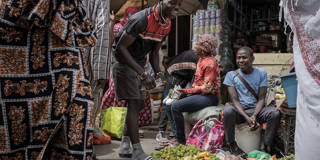Governments in the Global South have rushed to “clean up” cities and adopt strategies to formalize the informal economy in the wake of the COVID-19 pandemic. Yet such efforts often fail to recognize public space as a workplace and criminalize the affected workers.
WASHINGTON, DC – A wave of evictions recently hit in Dakar’s bustling Liberté 6 market, a roughly mile-long commercial hub that has served its community for more than 20 years. Hundreds of street vendors’ stalls were bulldozed to make way for a new bus system. Authorities gave prior notice and an indemnity to help with the loss of business, but did not address the real problem: the lack of trading space.

WASHINGTON, DC – A wave of evictions recently hit in Dakar’s bustling Liberté 6 market, a roughly mile-long commercial hub that has served its community for more than 20 years. Hundreds of street vendors’ stalls were bulldozed to make way for a new bus system. Authorities gave prior notice and an indemnity to help with the loss of business, but did not address the real problem: the lack of trading space.